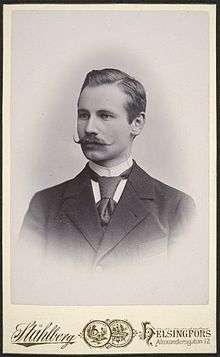Karl F. Sundman

Karl F. Sundman.
Karl Frithiof Sundman (28 October 1873, Kaskinen – 28 September 1949, Helsinki) was a Finnish mathematician[1] who used analytic methods to prove the existence of a convergent infinite series solution to the three-body problem in 1906 and 1909.[2][3][4] He also published a paper on regularization methods in mechanics in 1912. In the 1990s, Qiudong Wang generalized Sundman's solution to the case of more than three bodies.[5][6][7]
Awards, recognition
Sundman was awarded the Pontécoulant prize by the French Academy of Science in 1913 for this work.[1] In 1947, Sundman was elected a foreign member of the Royal Swedish Academy of Sciences. The crater Sundman on the Moon is named after him, as is the asteroid 1424 Sundmania.
References
- 1 2 Karl Frithiof Sundman bio
- ↑ Sundman, K. (1912). "Mémoire sur le problème des trois corps". Acta Mathematica. 36: 105–179. doi:10.1007/BF02422379.
- ↑ Hockey, Thomas A.; et al. (2007). Biographical Encyclopedia of Astronomers. Springer. p. 1111. ISBN 978-0-387-30400-7.
- ↑ June Barrow-Green (2010). "The dramatic episode of Sundman". Historia Mathematica. 37 (2): 164–203. doi:10.1016/j.hm.2009.12.004.
- ↑ Babadzanjanz, L. K. (1979), "Existence of the continuations in the N-body problem", Celestial Mechanics, 20 (1): 43–57, Bibcode:1979CeMec..20...43B, doi:10.1007/BF01236607, MR 0538663 .
- ↑ Wang, Qiu Dong (1991), "The global solution of the n-body problem", Celestial Mechanics and Dynamical Astronomy, 50 (1): 73–88, Bibcode:1991CeMDA..50...73W, doi:10.1007/BF00048987, MR 1117788 .
- ↑ Babadzanjanz, L. K. (1993), "On the global solution of the N-body problem", Celestial Mechanics and Dynamical Astronomy, 56 (3): 427–449, Bibcode:1993CeMDA..56..427B, doi:10.1007/BF00691812, MR 1225892 .
Sources
- Diacu, F.: The solution of the n-body Problem. The Mathematical Intelligencer, 1996, 18, p. 66–70.
- Järnefelt, G.: "Karl Fridhiof Sundman." Soc. Sci. Fenn. Arsbok 30 (2) (1953), 1–13.
- Järnefelt, G.: "Karl F. Sundman in Memoriam." Acta Mathematica 83 (1950), i–vi.
External links
This article is issued from
Wikipedia.
The text is licensed under Creative Commons - Attribution - Sharealike.
Additional terms may apply for the media files.